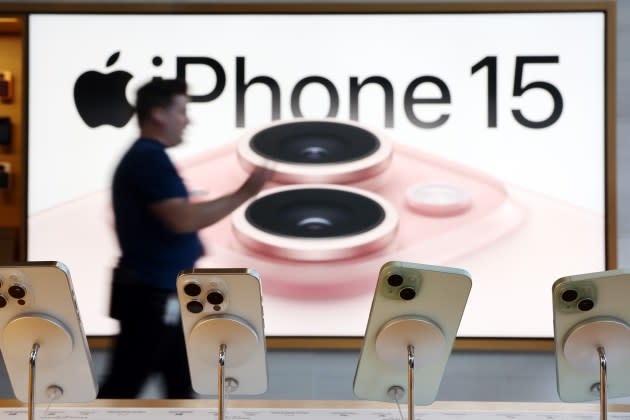Apple Sued by U.S. Justice Department, Alleging Tech Colossus Maintains Illegal Monopoly With iPhone

The Justice Department filed an antitrust lawsuit against Apple, alleging the company has established a monopoly with the iPhone that has harmed consumers, developers and competitors.
“Each step in Apple’s course of conduct built and reinforced the moat around its smartphone monopoly,” the government said in the 88-page lawsuit filed Thursday. “The cumulative effect of this course of conduct has been to maintain and entrench Apple’s smartphone monopoly at the expense of the users, developers, and other third parties who helped make the iPhone what it is today.”
More from Variety
The DOJ alleged that to keep consumers buying iPhones, Apple has engaged in anticompetitive conduct, including blocking cross-platform messaging apps, limiting third-party wallet and smartwatch compatibility, and disrupting non-App Store programs and cloud-streaming services. The lawsuit, filed in the U.S. District Court for the District of New Jersey, was joined by 15 state attorneys general and the AG of Washington, D.C. A copy of the complaint is available at this link.
The lawsuit seeks an injunction blocking Apple’s alleged anticompetitive practices as well as “relief as needed to cure any anticompetitive harm.”
“Consumers should not have to pay higher prices because companies violate the antitrust laws,” said U.S. Attorney General Merrick Garland said in a statement. “We allege that Apple has maintained monopoly power in the smartphone market, not simply by staying ahead of the competition on the merits, but by violating federal antitrust law. If left unchallenged, Apple will only continue to strengthen its smartphone monopoly.”
Shares of Apple closed down 4.1% Thursday.
Apple said in a statement that it would fight the government’s lawsuit, which it said rests on an unfounded legal theory that Apple has some obligation to design its products differently to help rivals.
“At Apple, we innovate every day to make technology people love — designing products that work seamlessly together, protect people’s privacy and security, and create a magical experience for our users. This lawsuit threatens who we are and the principles that set Apple products apart in fiercely competitive markets,” the company said in a statement. “If successful, it would hinder our ability to create the kind of technology people expect from Apple — where hardware, software, and services intersect. It would also set a dangerous precedent, empowering government to take a heavy hand in designing people’s technology.”
The DOJ lawsuit asserts that Apple engages in exclusionary, anticompetitive conduct in two ways: by imposing contractual restrictions and fees that limit the features and functionality that developers can offer iPhone users; and by selectively restricting access to the points of connection between third-party apps and the iPhone’s operating system, thereby “degrading” the functionality of non-Apple apps and accessories.
“As a result, for most of the past 15 years, Apple has collected a tax in the form of a 30% commission on the price of any app downloaded from the App Store as well as on in-app purchases,” Garland said in prepared remarks about the DOJ lawsuit. “Apple is able to command these fees from companies of all sizes.”
It’s the latest challenge aimed at reining in the power wielded by Apple, one of the most dominant tech companies in the world. Apple earlier this month was fined nearly $2 billion by the European Commission for “abusing its dominant position on the market for the distribution of music streaming apps” to iPhone and iPad users, following an investigation instigated by a complaint by Spotify.
Meanwhile, Apple faces accusations that it’s not abiding by a court judgment requiring it to open up the App Store. This January, Apple claimed that it was complying with a 2021 order in an antitrust case brought by Epic Games that requires it to let app developers direct users to “alternative, out-of-app purchasing mechanisms” instead of the App Store’s payment system. But Apple will apply a 27% commission to transactions through third parties for most developers, only slightly less than its standard 30% cut. On Wednesday, Meta, Microsoft, X (formerly Twitter) and Match filed a joint amicus brief in the Epic case alleging the Apple is not actually complying with the ruling. “The Apple Plan comports with neither the letter nor the spirit of this Court’s mandate,” the four companies said in the brief. A copy of the filing is available at this link.
Among other U.S. government litigation against Big Tech companies, the DOJ last year filed an antitrust lawsuit against Google and the FTC sued Amazon on antitrust grounds.
Best of Variety
From 'The Idea of You' to 'Apples Never Fall': The Best Book-to-Screen Adaptations to Read This Year
Sign up for Variety’s Newsletter. For the latest news, follow us on Facebook, Twitter, and Instagram.
